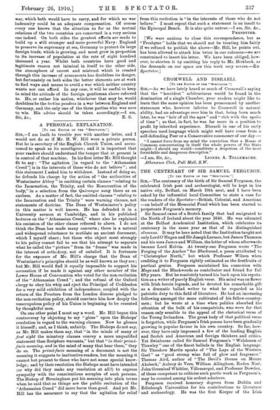A PERSONAL EXPLANATION.
[To THE EDITOR Of THZ "SPECTLT014"f
SIR,—I am loath to trouble you with another letter, and I would not do so if Mr. H. W. Hill were a private person. But he is secretary of the English Church Union, and accus- tomed to speak as its mouthpiece ; and it is important that your readers should understand the temper that at present is in control of that machine. In his first letter Mr. Hill thought fit to say : "The agitation [in regard to the Athanasian Creed'] is in the interests of those who do not believe "; and this statement I asked him to withdraw. Instead of doing so, he defends his charge by the action of "the authorities of Westminster Abbey" in omitting certain clauses "relating to the Incarnation, the Trinity, and the Resurrection of the body," in a selection from the Quicungue sung there as an anthem. As a matter of fact, the omitted clauses "relating to the Incarnation and the Trinity" were warning clauses, not statements of doctrine. The Dean of Westminster's policy in this matter is well known. He has defended it in a University sermon at Cambridge, and in his published lectures on the "Athanasian Creed," where also he explained his omission of the other clause referred to above. I do not think the Dean has made many converts ; there is a natural and widespread reluctance to mutilate an ancient document, which I myself share ; but those who object most strongly to his policy cannot fail to see that his attempt to separate what he called the " picture " from its " frame " was made in the interest of orthodoxy, not of unbelief. It is fortunate for the exposure of Mr. Hill's charge that the Dean of Westminster's principles should be as well known as they are ; but Mr. Hill would find it equally impossible to support his accusation if he made it against any other member of the Lower House of Convocation who voted for the non-recitation of the "Athanasian Creed "; and the refusal of the Oxford clergy to obey his whip and eject the Principal of Cuddesdon for a very mild exhibition of independence, coupled with the return of the Proctors from the London diocese pledged to the non-recitation policy, should convince him how deeply the unscrupulous policy of his Union is beginning to be resented by thoughtful men.
On one other point I mast say a word. Mr. Hill began this controversy by objecting to my " gloss " upon the Bishops' resolution in regard to the warning clauses. Now he glosses it himself; and, as I think, unfairly. The Bishops do not say, as Mr. Hill makes them say, that "in the minds of many at first sight the minatory clauses convey a more unqualified statement than Scripture warrants," but that "in their prima- facie meaning, and in the mind of many that hear them," they do so. The prima' -facie meaning of a document is not the meaning it suggests to inattentive readers, but the meaning it cannot but present to those who have not some special know- ledge; and by 'their resolution the Bishops must have intended (or why did they make any resolution at all?) to express sympathy with the conscientious scruples of such persons. The Bishop of Birmingham put his meaning into plain terms when he said that as things are the public recitation of the "Athanasian Creed" did more harm than good. And yet Mr. Trin has the assurance to say that the agitation for relief from this recitation is "in the interests of those who do not believe." I must repeat that such a statement is an insult to the Episcopal Bench. It is also quite untrue.—I am, Sir, &c.,
PanserrEa.
We were anxious to close this correspondence, but as "Presbyter" holds that we should not be treating him fairly if we refused to publish the above—Mr. Hill, he points out, has been allowed to attack him twice in our columns—we are constrained to insert his letter. We have been obliged, how- ever, to shorten it by omitting his reply to Mr. Birkbeck, as the demands on our space are this week very severe.—ED Spectator.]










































 Previous page
Previous page